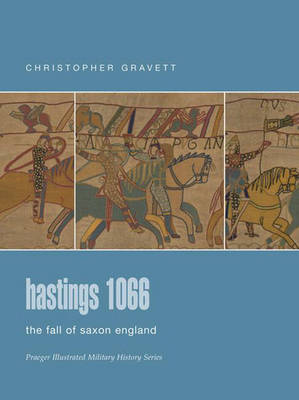Fought on 14th October 1066 between Duke William of Normandy and Harold Godwinson, king of England, the Battle of Hastings irrevocably changed the course of English history. William's victory ensured his accession to the English throne. Hastings was also decisive in another way: the horrendous casualties suffered by the English nobility both there and at the two earlier battles of Fulford and Stamford Bridge resulted in there being very few men influential enough to lead an English resistance once William had been crowned. William would survive long enough to successfully found a Norman dynasty of English kings.
Very...
Read more
Fought on 14th October 1066 between Duke William of Normandy and Harold Godwinson, king of England, the Battle of Hastings irrevocably changed the course of English history. William's victory ensured his accession to the English throne. Hastings was also decisive in another way: the horrendous casualties suffered by the English nobility both there and at the two earlier battles of Fulford and Stamford Bridge resulted in there being very few men influential enough to lead an English resistance once William had been crowned. William would survive long enough to successfully found a Norman dynasty of English kings.
Very few battles of the medieval period can be regarded as decisive but Hastings was certainly one of them. Fought on 14 October 1066 between Duke William of Normandy and Harold Godwinson, king of England, the outcome of the battle irrevocably changed the course of English history. William's victory was largely due to the tactical superiority of his forces: not only did he possess infantry and cavalry, but also a significant number of his troops were archers or crossbowmen, to whose withering fire the largely spear and axe-armed English infantry could make little reply. The eventual death of King Harold, possibly as a result of being struck in the eye by an arrow and then cut down, prompted an English collapse and victory for the Normans. The successful outcome of the battle ensured William's accession to the English throne. Hastings was also decisive in another way: the horrendous casualties suffered by the English nobility both there and at the two earlier battles of Fulford and Stamford Bridge resulted in there being very few men influential enough to lead an English resistance once William had been crowned. Although significant rebellions did take place into the 1070s against William's rule, these were largely localised: lack of a national figure-head due to the combats of 1066 thus helped ensure, in the longer term, that William would survive long enough to successfully found a Norman dynasty of English kings. Christopher Gravett explains the events in and surrounding this great battle in this excellent Campaign title.
- ISBN10 0275988392
- ISBN13 9780275988395
- Publish Date 14 September 2005 (first published 30 January 1992)
- Publish Status Out of Print
- Out of Print 13 July 2009
- Publish Country US
- Publisher ABC-CLIO
- Imprint Praeger Publishers Inc
- Format Hardcover
- Pages 96
- Language English
